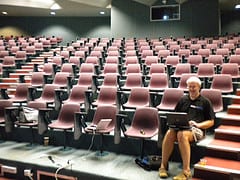
The other day I attended a very interesting seminar on “Prefiguring democratic education” which got me thinking about my own practice, and what I might be able to do to make more of a contribution to the sort of socially just, democratic society that I think education is supposed to be working towards. Prefigurative politics is, put very simply, the idea that you try and create a more just society through social innovation, while always recognising and documenting existing social constraints. So it behoves me to reflect on how I might incorporate it into my own practice
I lead, and do most of my teaching on, a couple of modules on a professional doctorate programme, (which I also co-direct). This programme, by definition, is pitched at a very high academic level, and thus is somewhat exclusive. To succeed a student needs to have considerable previous, experience of academic work, and ideally should have done some primary research before starting the course. Much as we might want to open it up to anyone who was suitably inspired, I can’t help thinking that if I did so, we would find that students who didn’t have the “correct” background would struggle. So from the very start, I have a set of social constraints. What would be involved in “opening up the doctorate”? Yes, I know there are lots of admirable initiatives such as the Lincoln Social Science Centre and any number of MOOCs which try to do precisely that though I am not sure that they are able to address all of the existing social relations around doctoral study. Which are, inter alia
- The almost exclusively textual nature of study at this level
- The relative inaccessibility of many of those texts
- The exclusivity of language used in those texts
- The demand for “originality” with its concomitant emphasis on individual achievement,
- individual responsibility for methodological design?
- The enormous workload expected of doctoral students
My point is that it institutions, with their fees and matriculation protocols are only part of the barriers to wider access to advanced level study. We can do more to prepare students for it. In the spirit of prefigurative politics, I’m thinking there might be scope to introduce a “taster” course using freely available technologies which would allow students to present and share their ideas for doctoral study. I would be the first to admit that this needs an enormous amount of thought, but one way forward might be to facilitate students making a short pitch for their research problem in at least three different media and then discuss each other’s contribution using a wiki or similar technology. The idea of using different media is to get away from the primacy of texts, since following McLuhan, if the medium is the message, then there are going to be subtleties in the different messages. (Though if I’m honest, I did rather pick the figure of three out of the air!)
For example a student researching the transition to school leadership from teaching might offer a description of their own experience of moving into a new more senior position, upload a photo essay, and make a short audio recording. (These may or may not have anything to do with education) Other students (and any interested researchers) could then relate these stories to their own individual experiences. There would be no notion of passing or failing – you’d have to be inspired to participate and create. In fact if you were inspired you might then consider pursuing the more formal course. You might reasonably ask how this is “prefigurative”. Well I think it is important to get away from the primacy of the academic text and show students that their own, their colleagues and ultimately their research participants’ experiences are as valid as anything described between hard covers and shoved onto a shelf in the University library. Of course none of this begins to resolve any of the larger issues. The fact that all formal education is essentially about creating social divisions between the “have-qualifications” and the “have not-qualifications” is a major problem. Then again, if we are to occupy unused parts of the educational landscape we have to start somewhere, and this is as good a place to cut through the barbed wire as anywhere. I’m open to ideas, though I suppose I should practice what I preach and try and do something like this myself.

You must be logged in to post a comment.